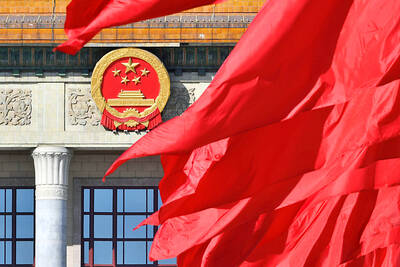South Korea’s spy agency has admitted that it had engaged in a far-reaching attempt to manipulate voters as it sought to help conservatives win parliamentary and presidential elections.
In-house investigators from the National Intelligence Service (NIS) confirmed that the agency’s cyberwarfare unit organized and operated up to 30 teams for more than two years in the run-up to the 2012 elections, the agency said in a statement late on Thursday.
They hired Internet-savvy civilians and sought to sway voter opinions through postings on portals and Twitter, the statement said.

Photo: AP
“The teams were charged with spreading pro-government opinions and suppressing anti-government views, branding them as pro-North Korean forces’ attempts to disturb state affairs,” it said.
At the time South Korea was led by president Lee Myung-bak.
Former South Korean president Park Geun-hye won the December 2012 presidential election, defeating Moon Jae-in.
Moon won South Korea’s presidential vote in May this year after Park was impeached and dismissed over corruption and abuse of power.
He has vowed to reform the NIS to prevent it from meddling in elections and make it focus on collecting and analyzing intelligence on North Korea and foreign affairs.
A spokesman for Park’s party, now in opposition and renamed Liberty Korea, yesterday said that the inquiry was “politically motivated.”
“The NIS says it will dissociate itself from politics, but it is meddling in politics again by starting this probe,” spokesman Kang Hyo-sang said in a statement.
Former NIS chief Won Sei-hoon is being tried for the second time for leading an online smear campaign against Moon after his initial conviction was overturned on appeal.
However, the NIS investigation results suggest the scale of the voter manipulation was far wider than previously thought.
The internal probe also found that Won ordered the agency to muzzle the press, provide support for pro-government civic groups and put some major opposition politicians under secret surveillance.

US PUBLICATION: The results indicated a change in attitude after a 2023 survey showed 55 percent supported full-scale war to achieve unification, the report said More than half of Chinese were against the use of force to unify with Taiwan under any circumstances, a survey conducted by the Atlanta, Georgia-based Carter Center and Emory University found. The survey results, which were released on Wednesday in a report titled “Sovereignty, Security, & US-China Relations: Chinese Public Opinion,” showed that 55.1 percent of respondents agreed or somewhat agreed that “the Taiwan problem should not be resolved using force under any circumstances,” while 24.5 percent “strongly” or “somewhat” disagreed with the statement. The results indicated a change in attitude after a survey published in “Assessing Public Support for (Non)Peaceful Unification

The CIA has a message for Chinese government officials worried about their place in Chinese President Xi Jinping’s (習近平) government: Come work with us. The agency released two Mandarin-language videos on social media on Thursday inviting disgruntled officials to contact the CIA. The recruitment videos posted on YouTube and X racked up more than 5 million views combined in their first day. The outreach comes as CIA Director John Ratcliffe has vowed to boost the agency’s use of intelligence from human sources and its focus on China, which has recently targeted US officials with its own espionage operations. The videos are “aimed at

‘MISGUIDED EDICT’: Two US representatives warned that Somalia’s passport move could result in severe retaliatory consequences and urged it to reverse its decision Minister of Foreign Affairs Lin Chia-lung (林佳龍) has ordered that a special project be launched to counter China’s “legal warfare” distorting UN Resolution 2758, a foreign affairs official said yesterday. Somalia’s Civil Aviation Authority on Wednesday cited UN Resolution 2758 and Mogadishu’s compliance with the “one China” principle as it banned people from entering or transiting in the African nation using Taiwanese passports or other Taiwanese travel documents. The International Air Transport Association’s system shows that Taiwanese passport holders cannot enter Somalia or transit there. The Ministry of Foreign Affairs (MOFA) protested the move and warned Taiwanese against traveling to Somalia or Somaliland

SECURITY: Grassroots civil servants would only need to disclose their travel, while those who have access to classified information would be subject to stricter regulations The government is considering requiring legislators and elected officials to obtain prior approval before traveling to China to prevent Chinese infiltration, an official familiar with national security said yesterday. President William Lai (賴清德) in March announced 17 measures to counter China’s growing infiltration efforts, including requiring all civil servants to make trips to China more transparent so they can be held publicly accountable. The official said that the government is considering amending the Act Governing Relations Between the People of the Taiwan Area and Mainland Area (臺灣地區與大陸地區人民關係條例) to require all civil servants to follow strict regulations before traveling to China.